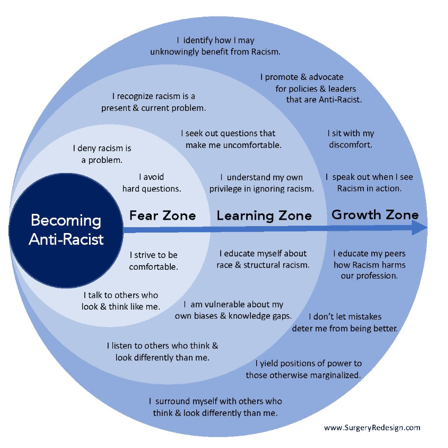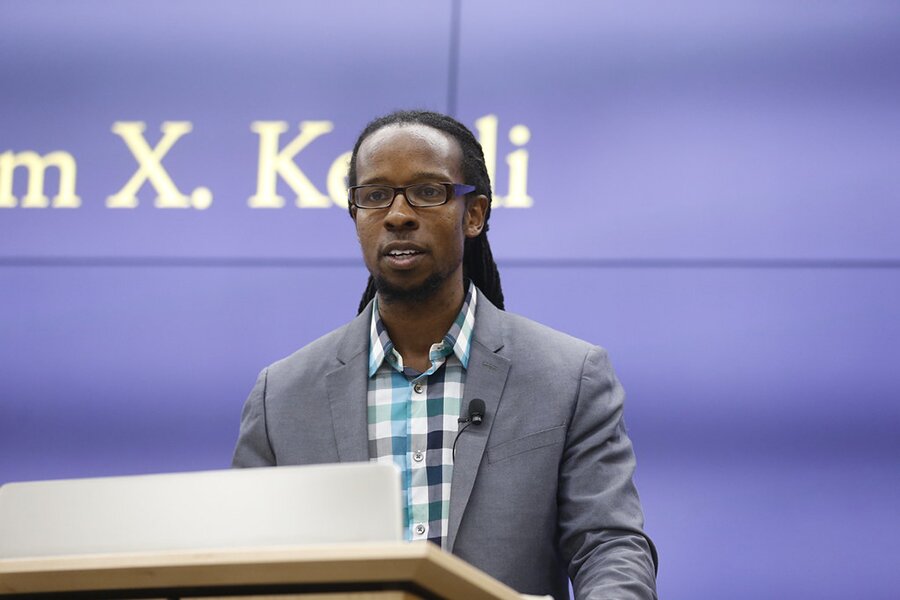DMC's Diversity, Equity, and Inclusion task force recently led an internal training series focused on topics related to Unpacking Racism. We wanted to share the resources that we assembled. This post covers the information shared during our third training in the series which we called "Becoming an Anti-Racist."
Topic Overview
After becoming open to a discussion in session one, we examined systemic racism in session two. Our third and final session in this series discussed "Becoming an Anti-Racist."
Definition
We shared the following definition of an anti-racist. "People who are actively seeking not only to raise their consciousness about race and racism but also to take action when they see racial power inequities in everyday life. Being an antiracist is very different from just being “nonracist."
This diagram illustrates becoming an anti-racist.

Racial Biases
Next, we watched a video of Ibram Xolani Kendi. He is an American author, professor, and historian of race and discriminatory policy in America. Kendi explains that there is no such thing as a non-racist. All policies and ideas either hamper or advance equality.

Source: VCU Libraries
Dr. Kendi has also stated, “Racist and antiracist are not fixed identities. We can be racist one minute and an antiracist the next.”
As we’ve learned in our last two sessions, everyone has racial biases. Our culture and media are all rooted in racial inequity, so just by the nature of growing up exposed to this type of content, we will have racial biases.
We discussed that scholars teach that a big part of being anti-racist is acknowledging that you have internal racism and you can act in ways or support things that are racist. A big part of anti-racism is acknowledging that and then working to dismantle racism in yourself. In order to be anti-racist, we have to continually examine ourselves.
Steps to Ending Racial Inequality
Next, we shared Dr. Kendi's steps to ending racial inequality and asked attendees to reflect on these ideas.
- Acknowledge that the problem is caused by policy, not people
- Acknowledge that racial inequity is intersectional
- Find out which specific policies are causing inequity
- Come up with new antiracist policies to replace them
- Determine which individuals or groups have the power to put antiracist policies into place
- Educate the public about specific racist policies and antiracist replacements
- Connect with antiracist policymakers to get the new antiracist policies implemented
- Get rid of racist policymakers by asking antiracist policymakers to force them out of office
- Make sure the new antiracist policy is having an equalizing effect
- If the policies aren’t working, look for new policies, not new people
- Keep an eye on policymakers to make sure no new racist policies come into effect
Discussion Questions
Finally, we brought in some voices from throughout DMC to answer discussion questions. Our goal was to share information with each other so we can all learn and grow in our journeys to be anti-racist and normalize these reflections.
- Can you think of a time when you noticed growth in your ability to recognize racism?
- What works for effectively dismantling racism within your community (friends, family, church, teams, workplace)?
- What works for effectively dismantling racism within a conversation or with an individual?
- What works for effectively dismantling racism in institutions (donations, advocacy, political involvement)?
- How will you personally work to address bias when performing recruiting, managing others, and other subjective processes in the workplace?
- If you received feedback that something you or another in the workplace had done/said that perpetuated racism, how would you want to approach receiving that feedback? What actions might you take?
- Do you have any tips for disrupting racism in the workplace? What steps have you found to be useful? What steps have been ineffective?
- What are good ways to be an ally and supportive without being performative, a "white savior", or overstepping? Is there a line between being supportive and overstepping which could hurt the movement?
We hope that this series empowered attendees to be informed and positively influence racism in the world!
Learn about the other topics in this series:
Part One: Being Open to a Discussion
Part Two: Systemic Racism
Learn more about DMC's company culture.